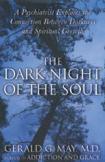Mystic Madness
Gerald G. May’s name will be familiar to many readers from his previous writings on spiritual matters. The present volume offers a series of reflections on his study of the spiritual writings of Teresa of Avila and John of the Cross, two of the greatest and most authentic of Christian mystics. The result is a succinct, literate, graceful exposition of their basic mystical theology that provides not only a successful and easily accessible popular introduction to their spiritual thought, but also a devotional and at times personal testimony that many readers will find inspiring and uplifting. The writing is clear, straightforward in expression and unencumbered with jargon. For a book that provides unfamiliar readers with a basic approach to these great mystical thinkers, one could hardly do better.
For readers who may be more familiar with Teresa and John, however, a few cautionary notes may be in order. Despite the subtitle and the fact that Dr. May is a practicing psychiatrist, he makes little effort to articulate the interplay and/or disparity between the psychological and the spiritual dimensions of mystical experience. One striking exception occurs in the chapter dealing more directly with psychological matters, especially depression and addiction. There the author’s treatment is practical and pragmatic, and his sage advice is well taken. But throughout the book, May fails to grapple with more controverted and problematic issues, such as the difference between clinical depression and spiritual desolation. The differences are merely asserted without further exploration or justification.
The focus of this book is the work of Teresa and John, both of whom May presents as exponents of apophatic mysticism, for whom the deity is the hidden God of the via negativa, unreachable by human cognitive resources and reachable in the darkness of obscurity only through love. This God is a negative God, who is essentially unknown and unknowable—the Deus absconditus of this mystical tradition. We need to remind ourselves that there is another equally valid and esteemed mystical tradition, the kataphatic approach, in which God is knowable but only in limited and analogous ways. This God is the God of the via affirmativa.
Following his models, May spurns the kataphatic—he does not even mention it except for an occasional potshot at Ignatius of Loyola, another of the great Christian mystics and representative of the kataphatic tradition, who accompanied Teresa to the honors of the altar. Many would consider Teresa to be more aligned with the kataphatic approach, despite her occasionally reluctant disclaimers, and probably because of her greater emphasis on method.
There is a problem in the author’s seeming homogenization of the two saints. In countless statements, the dual subject is either “Teresa and John” or “John and Teresa.” This leaves the impression that they differed little, if at all, in their views. While the level of correspondence and congruity of their thinking is admittedly substantial, the author’s more or less exclusive emphasis on this risks ignoring differences that some would consider essential and fundamental. One, for example, is the Christological emphasis in Teresa, which is entirely absent in John’s writings.
Finally, I find problematic the author’s apparent effort to democratize or reduce to its least common denominator the concept of the “dark night.” May repeatedly asserts the equivalence of the dark night with the trials and tribulations of ordinary human experience. If this is so, we are all victims of the dark night, caught up in the toils and trammels, the pains and afflictions of human existence. But it seems difficult to connect such an understanding of the dark night with John’s emphasis on the dark night as a mystical phenomenon linked for the most part with the transition from meditation to the higher range of mystical contemplation. Not all of us are mystics; not all of us are called to mystical contemplation. Here I would have liked a clearer delineation between psychic depression and spiritual desolation, the latter of which characterizes the dark night.
Despite these reservations, which belong to a deeper and more problematic probing of the meaning of the profound teachings of both Teresa and John, one should not ask for more than Dr. May has attempted or intended. The Dark Night of the Soul is a sensitive and inspiring testimony to two great Christian thinkers. Readers who seek to know something about them will be gratified and well rewarded by reading it.
This article also appeared in print, under the headline “Mystic Madness,” in the March 1, 2004, issue.








